Published on June 9, 2025 3:32 PM GMT
Crosspost from my blog.
I just got back from Effective Altruism Global London—a conference that brought together lots of different people trying to do good with their money and careers. It was an inspiring experience. When you write about factory farming, insect suffering, global poverty, and the torment of shrimp, it can, as I’ve mentioned before, feel like screaming into the void. When you try to explain why it’s important that we don’t torture insects by the trillions in insect farms, most people look at you like you’ve grown a third head (after the second head that they look at you like you’ve grown when you started talking about shrimp welfare).
But at effective altruism conferences, people actually care. They’re not indifferent to most of the world’s suffering. They don’t think I’m crazy! There are other people who think the suffering of animals matters—even the suffering of small, weird animals that are typically given short shrift.
I met lots of awesome people at the conference.
I met the legends who cofounded the shrimp welfare project—Aaron Boddy and Andrés Jiménez Zorrilla:
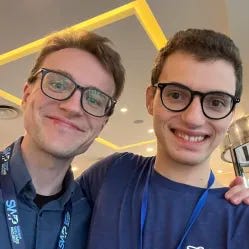
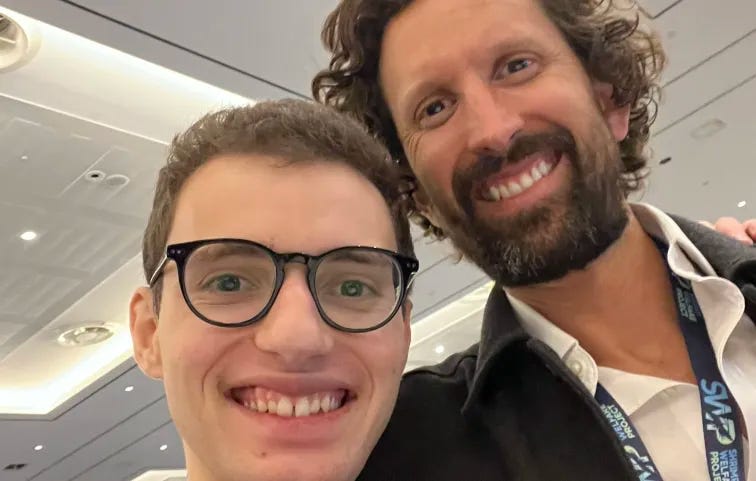
They are, by highly conservative estimates, two of the ten coolest people on Earth. So it was awesome that I got to meet two people who cofounded an organization that has prevented billions of shrimp from experiencing extreme suffering—thousands for every dollar they’ve raised. Their organization is responsible for helping a number of animals roughly on the order of the number of people in the world. True heroism isn’t just giving your life for an important cause, but being willing to endure weird looks working on a cause just because it’s important. They were also extremely likeable in person; I found Andres to be one of the most charismatic people I’d ever met.
I met too many interesting people to name. I met a woman named Joanna who volunteers for Anima International. Anima International works to get cage free commitments from corporations—to get chickens out of the ghastly cages that ensnare them by the billions. And it’s working! They’ve secured a sizeable number of commitments.
(Joanna was also randomly an insanely good artist and made an excellent drawing of both a shrimp and insect on my hand. George Bush once said “I know the human being and fish can coexist peacefully.” I like to think that the drawing of an insect and shrimp on my hand represent the possibility of peaceful human coexistence with insects and shrimp—a possible brighter future where we don’t torture them by the trillions. Or something, idk, I’m just spitballing here).
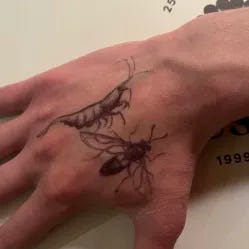
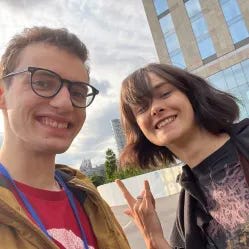
I met Jack Hancock—of Humane Hancock fame! He has an excellent YouTube channel that’s done a lot to get wild animal suffering on the radar of animal advocates. He was one of the first people I heard about the importance of wild animal welfare from.
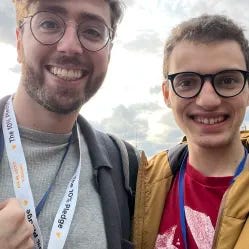
I met Mithuna who runs the YouTube channel Through The Looking Glass. It’s mostly about physics, but she’s thinking of trying to branch out to promote animal welfare to her hundreds of thousands of viewers! Dispiritingly few people with major platforms actually use those platforms to try to effectively do good. Mithuna is a refreshing exception to that! I also met
author of an insanely good blog about EA stuff. He was as interesting in person as I’d have expected him to be.
I met Will MacAskill, one of the people who cofounded effective altruism. Effective altruism—a movement that’s responsible, at the very least, for preventing the torture of billions of shrimp, saving hundreds of thousands of lives, improving the conditions of farm animals, and safeguarding the future—was cofounded by this guy. And I got to meet him! Whoo! He even knew who I was and gave me helpful advice about becoming a high impact public intellectual. They say never meet your heroes, but all the ones I have met have been as cool as I’d expected them to be.
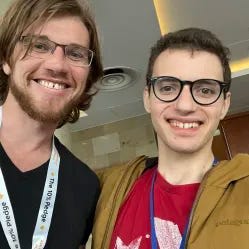
(Will also generously described me in a q&a as an especially effective EA and referred to me as “the great Bentham’s Bulldog,” which is among the coolest bits of praise I’ve ever gotten. I did not expect such things when I started blogging in high school—originally just with the intention of explaining why Michael Heumer was wrong about utilitarianism. It goes without saying that Will should be introduced in podcasts as “the great Will MacAskill”).
The conference was filled with people trying to make a difference. I learned about people trying to combat the hideous abomination of insect farming. I learned about people thinking seriously about genetically modifying animals so that they would feel less pain. It was one of the most inspiring events of my life!
We live in a world filled with very large amounts of suffering. Billions of animals languish in cages. Orders of magnitude more fish languish in underwater torture chambers. Orders of magnitude more animals than that suffer in horrendous conditions in the wild. Global poverty and disease kills thousands of children daily. Future technology threatens to doom the world—technology for which the world is not adequately prepared.
And very few people seem to care. When you tell most people about it, they simply ignore it. Occasionally—if you are very lucky—you can get them to give a bit of money. It can be dispiriting to see how few people are willing to seriously address the world’s problems.
But effective altruism conferences show that there are people who care. There are people willing to do something about the extreme suffering that is as ubiquitous as it is ignored. There are people who recognize the ongoing moral catastrophes and spend their lives fighting them. They confront the problems of the world head on. They do not look away, they do not concoct convenient excuses for why they don’t need to do anything. They do what must be done. Borrowing the phrase from the Nike slogan, they just do it!
The people who fill EA conferences show that you don’t have to sit idly by as trillions are tortured and developing threats risk the entire future. You can give money to the organizations helping the most vulnerable conscious beings. You can spend your career fighting against the ongoing moral catastrophe that fills the world. You can spend your life tackling the world’s most pressing problems.
The poem Do not go gentle into that good night begins:
Do not go gentle into that good night,
Old age should burn and rave at close of day;
Rage, rage against the dying of the light.
The last of these lines has always stuck with me when thinking about EAs. These are the people raging against the dying of the light. These are the people who are not complacent in the face of a world filled with needless misery. These are the people actually fucking doing something about them. And you can too!
To combat the world’s most pressing problems, you don’t have to be some wizard with 20,000 IQ points. You just have to care enough to do something about it. To be willing to take a career addressing the world’s biggest problems or to give your money to fighting them.
The most infamous EA pitch is a spinoff Peter Singer’s drowning child analogy. With every passing moment, children die whom we can save. When we don’t act, Singer claims, we are behaving monstrously. We are like the people who walk past drowning children because wading in to save them would ruin our coat.
But I think this is much too gloomy a way to frame it. Imagine if you discovered that the world was filled with drowning children. Most people ignored them. But you—you—could be part of a rescue effort to save them. You could save thousands, perhaps even tens of thousands, all the while working alongside a community of smart, interesting, and decent people who care as much as you do. A community of people who don’t look away from the drowning children, who don’t ignore them because they’re far away and helping them is inconvenient, but who rush in and tries to save as many as possible.
A life spent saving these drowning children would seem to be a deeply meaningful one. It would be one spent raging against the dying of the light. It would be one of the few lives spent grappling with the serious injustice of the world. Not looking away, not ignoring the children drowning, but neither being overcome with crushing guilt.
It isn’t just other people that can do that. Aaron Boddy and Andres Jimenez Zorilla are not some magical special build of human. You too can do it! If you haven’t decided on your career, I’d encourage you to go to the 80,000 hours website or job board and start seriously thinking about how you can use your time, money, and career for good. You can take the Giving What We Can pledge and give 10% of your earnings to effective charities. For just a slight decline in your income, you can save dozens of lives, help make sure the future goes well, and improve conditions for billions of animals.
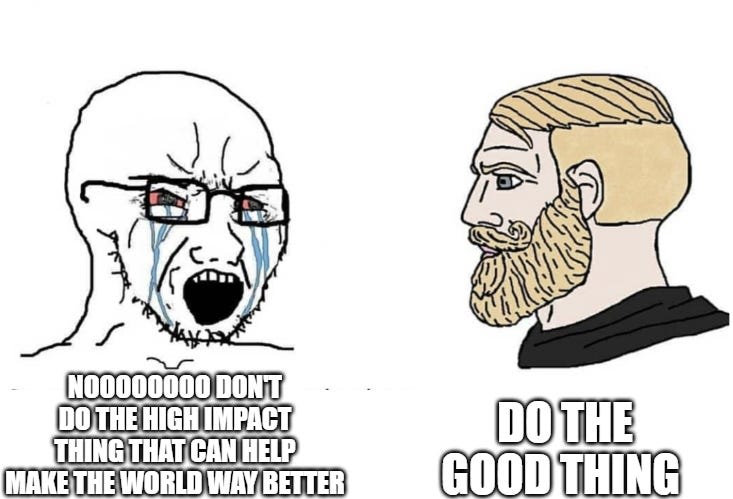
You don’t just have to sit back and look glumly upon the world’s problems. You can found a charity working on combatting the suffering of neglected animals. You can work in governance—helping pass laws that improve conditions for animals, people overseas, and safeguard against emerging technology. You can work for an existing charity start-up, do research on AI alignment, or any of dozens of other things that could be high impact. If you’re serious about taking a high impact career, there are lots of others who will help you out! If, for instance, you’re trying to found a charity start-up, there’s an entire school of people who will help you out.
I’m not a very emotional person in general. But when I think about people spending most of their waking hours trying to spare shrimp from extreme suffering or trying to save the lives of distant humans who will never get to thank them, I get a lump in my throat. A community spent raging against the dying of the light, spent trying desperately to help others—not because those others will reward you, not because it’s high status, not because you get to boast about how much you helped people at parties, but because it’s the right thing to do.
I cannot think of anything more inspiring than being part of such a community.
Discuss

